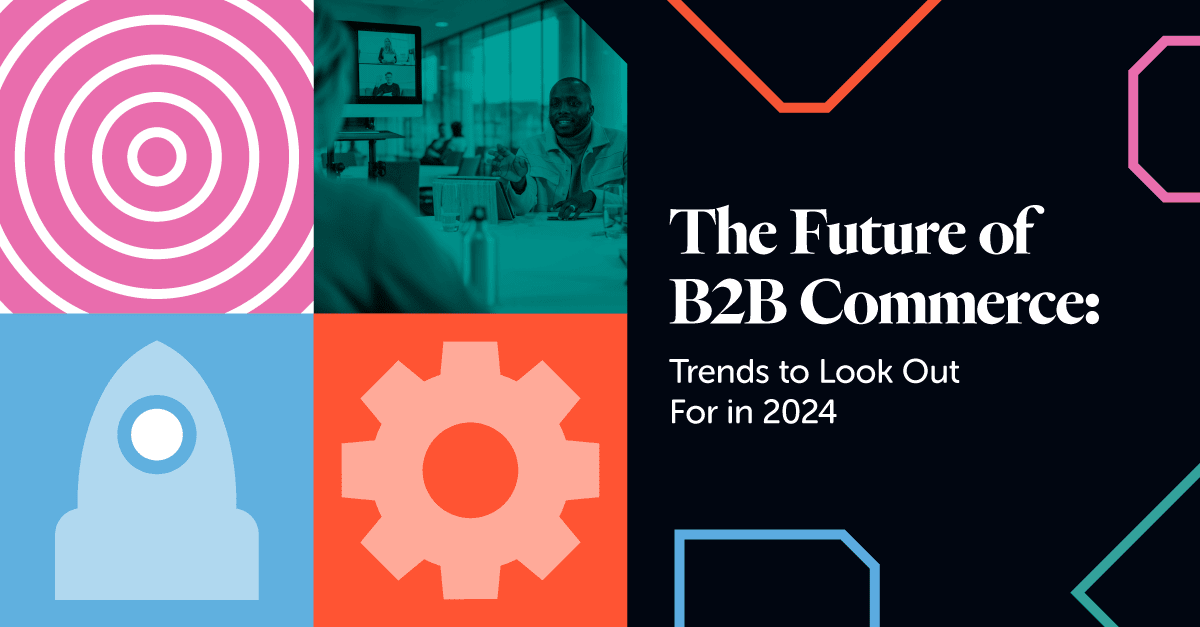The Future of B2B Commerce: Trends to Look Out For in 2024
We know that B2B is here to stay, but what trends should ecommerce businesses be looking out for in 2024?

Intro
eCommerce has transformed the way we sell and buy, and this is certainly true for B2B businesses. According to Lance Owide, General Manager of B2B at BigCommerce, “The way B2B buyers shop is changing. They’re turning to online channels to research, compare and purchase products. B2B merchants need to have a strong online presence and offer a seamless omnichannel shopping experience to keep buyers loyal and converting.” BigCommerce’s Global B2B Buyer Report also revealed that 74% of B2B buyers transact or purchase using online platforms, and 80% of buyers are making purchases online at least once per week.
So, we know that B2B is here to stay, but what trends should ecommerce businesses be looking out for in 2024?
A Change in Buyer Expectations
As Baby Boomers and Generation X begin leaving the workforce and embracing retirement, many Millennials and Gen Z’ers are taking their place. With this shift comes a whole new B2B demographic with vastly different expectations when it comes to purchasing online. This new, digital-savvy consumer-base has much higher standards that B2B merchants are struggling to deliver on. According to Forrester, this younger group is also much quicker to express dissatisfaction, with 90% citing dissatisfaction with their vendor in at least one area compared to 71% of older buyers. In order to keep up with the growing demands of a new generation of B2B customers, merchants will need to adapt their strategies to provide the streamlined experience that is now expected.
Artificial Intelligence – More Than Just a Buzzword
AI entered the mainstream in 2023, and it’s here to stay. As GenAI continues to evolve, its offerings are extending beyond ChatGPT and enhanced image production. In B2B in particular, areas that experts are highlighting include enhancing search capabilities, personalising customer experiences, and streamlining content production.
“Additionally, the B2B environment in 2024 will be increasingly digital, data-driven, and efficiency-oriented, with a strong focus on leveraging technological advancements like AI to enhance operations and customer experiences. In particular, advanced personalization through AI will go beyond basic product recommendations to include tailored customer journeys based on business needs, purchase history, and behavioural analytics”, Lance Owide says.
Omnichannel Selling
The Covid-19 pandemic changed a lot about the way we buy and sell, particularly for B2B consumers. With tradespeople expecting to make all the purchases they need from their phones and via digital platforms, ecommerce businesses will need to provide an omnichannel experience that seamlessly integrates shopping channels. With 80% of B2B purchases happening from mobile devices (according to research from Boston Consulting Group), you should be adopting a mobile-first approach that ensures your site is properly optimised for mobile use.
B2C Experiences for B2B Shoppers
As B2B continues to invade the ecommerce landscape, it’ll have to compete with the B2C experience that online shoppers are used to. Although there are a lot of differences in how ecommerce businesses should approach B2B vs B2C, they have something very important in common – customer experience should be at the core.
In order to provide a B2C buying experience for B2B customers, businesses will need to:
- Understand your customer personas and their needs/wants.
- Provide a frictionless checkout experience.
- Make sure your site is optimised for mobile – with many B2B customers heading straight to their phones to research products, they’re likely to be coming to your site from their mobile device.
- Be transparent and clear about pricing and product information – this is especially important with large order values that are commonplace in B2B.
- Offer ongoing support and ask for feedback – B2B experiences should be built on trust.
Self-Service Shopping
Despite the importance of personalisation and customer service in the world of ecommerce, more consumers are favouring systems that allow them to self-serve with ease, especially in the B2B space. Efficient self-service portals empower consumers with the information they need to make informed purchasing decisions, which ultimately builds a sense of trust and prevents any issues post-purchase. A seamless self-service shopping process also reduces customer service queries, freeing your staff up for more complex tasks.
Subscription Models
As trust is such an important factor when it comes to B2B selling, subscription models can help to build this with greater personalisation and loyalty benefits. B2B subscription models could include:
- Refills of essential items
- Curated items
- Access to exclusive content
- Subscribe and save
Here at 5874 Commerce, we’re a B2B certified BigCommerce Elite partner, so our team is experienced in providing B2B solutions. From complex replatforming to modernising old setups, we can help your B2B business compete in the ecommerce landscape. Contact us here to find out more, and why not check out one of our B2B case studies to see what we can do.
If you would like more information on what 5874 could do for you
Chat to us